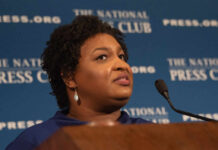
In an appearance this week on ABC’s “The View,” former Secretary of State Hillary Clinton invoked a jarring historical comparison, equating President Donald Trump’s potential re-election to the rise of dictators such as Adolf Hitler. The hypocritical attack comes when the political divide in America has rarely been more pronounced.
Clinton, a figure who has long stirred controversy, asserted that Trump’s return to the Oval Office in 2024 could signal “the end of our country as we know it.” Her remarks reflect a deep-seated and long-lasting grudge for the man who thwarted her presidential ambitions in 2016.
JUST IN: While many of her supporters are making anti-Semitic comments & calling for the end of Israel, twice failed presidential candidate Hillary Clinton compares Trump to Hitler.
Clinton tried explaining how Trump was similar to Hitler but instead explained exactly what… pic.twitter.com/JkSe3Fu3Od
— Collin Rugg (@CollinRugg) November 8, 2023
To many conservative thinkers and voters, Clinton’s rhetoric is seen as a hyperbolic ploy aimed at stoking fear rather than fostering constructive political discourse. Drawing parallels between Trump, a democratically elected former president, and Hitler, a totalitarian dictator, is not only historically disingenuous but also indicative of a troubling trend within some political circles to demonize opposition at any cost.
Clinton’s comments overlook that the United States experienced significant policy victories under Trump’s administration. These achievements included tax reforms, strides in international diplomacy and a focus on American industry that resonated with many voters. Her claims that Trump would hire “yes-men” devoid of principles in a potential second term seem to conveniently ignore history and the checks and balances that are the bedrock of American governance.
Furthermore, the allegations of Trump’s dictatorial tendencies fly in the face of the robust debate and political engagement that characterized his first term. Despite unprecedented scrutiny and investigation, including a 674-day probe into alleged Russian collusion, Trump’s administration operated within the legal frameworks set by the Constitution and overseen by both Congress and the judiciary.
Clinton’s suggestion that Trump’s 2016 victory led to attempts to undermine the electoral process also seems at odds with the facts. During her tenure as Secretary of State, concerns over election integrity and foreign interference became pronounced issues. These concerns have persisted and are not unique to either political party.
The conservative electorate views these claims with skepticism, valuing facts over fearmongering. The idea of a “formal deprogramming” of Trump supporters, as Clinton posited in a past interview, is anathema to the values of free thought and speech that are central to the American ethos. It hints at a willingness to dismiss and even silence the voices of nearly 74 million Americans who voted for Trump in 2020, which is itself an authoritarian impulse.
The conversation about the future of America, especially as the 2024 election looms, would be better served by focusing on substantive policy discussions rather than engaging in alarmist rhetoric. In the eyes of many, the greatness of America is best preserved by embracing the diversity of its political thought, promoting civil discourse and respecting the democratic process.




























